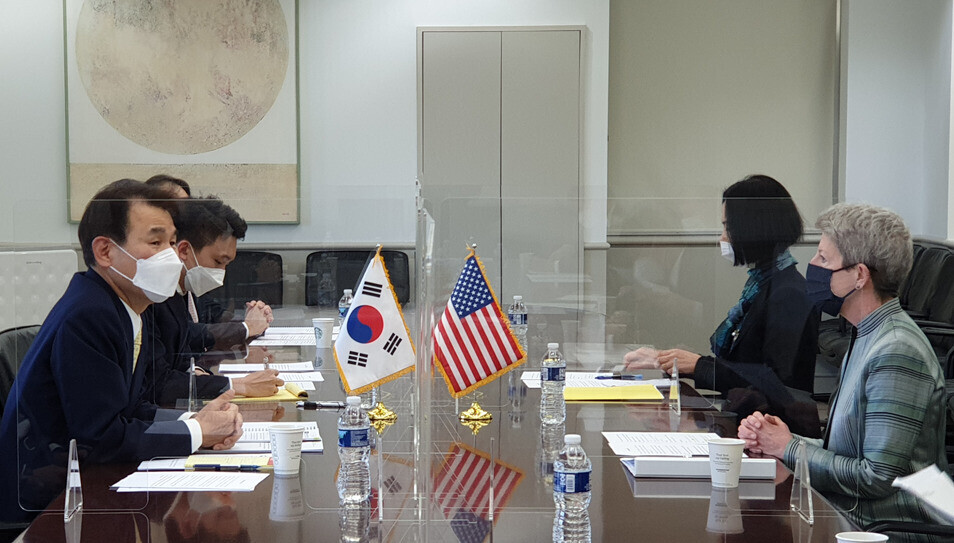hankyoreh
Links to other country sites 다른 나라 사이트 링크
[Editorial] Is new S. Korea-US defense cost-sharing deal fair and equitable?

The South Korean government has released the details of its latest defense cost-sharing arrangement with the US. The 11th Special Measures Agreement (SMA) will run for six years, from 2020 (retroactively) to 2025.
In its explanation of the agreement Wednesday, the Ministry of Foreign Affairs (MOFA) congratulated itself for having “defended the principle of reasonable and fair burden-sharing during a challenging negotiating process.”
But taking a closer look at the agreement, we find it hard to agree with that assessment. The total amount of South Korea’s contribution is excessive, and the criteria for applying the rate of increase is favorable to the US.
To be sure, South Korean negotiators had some successes. One encouraging systemic change is the two sides’ agreement to ensure that the employment status and livelihood of South Koreans working for US Forces Korea (USFK) aren’t affected by the cost-sharing negotiations.
Under the new agreement, workers will continue to be paid wages at the level of the previous year even if the agreement expires without the negotiations concluding. That makes it possible to prevent a recurrence of what happened in April 2020, when South Korean employees for USFK were furloughed without pay.
The problem is the excessive amount of South Korea’s total contribution. In 2021, South Korea will be paying 1.18 trillion won (US$1.04 billion), 13.9% more than the 1.04 trillion (US$913.3 million) it paid in 2019, and that contribution will increase in proportion to South Korea’s defense budget in the previous year for each of the next four years.
Considering that the cost-sharing negotiations had broken down last March because of former US President Donald Trump’s absurd demand for a 500% increase in South Korea’s contribution, the current agreement might initially look reasonable.
But the steep rate of increase each year is expected to bring South Korea’s defense contribution to 1.5 trillion won (US$1.32 billion) by 2025, representing a 50% increase from 2020. That’s comparable to the 1.48 trillion won that Trump demanded from Seoul last year as its first year’s contribution.
While the Biden administration has emphasized restoring alliance relationships, Biden is little different from his predecessor in the sense that he took an opportunity to profit the US at the expense of South Korea.
Unlike the past, the rate of increase in Seoul’s burden-sharing contribution is now pegged to the rate of increase of its defense budget. While MOFA described “the rate of increase of the defense budget as a reasonable and credible standard,” it actually works in the interests of the US.
According to the mid-term national defense plan (for 2021-2025) that the Ministry of National Defense announced last year, South Korea’s defense spending is slated to rise by a yearly average of 6.1%. In recent years, defense spending rose by 7% in 2018, 8.2% in 2019 and 7.4% in 2020. We can expect defense spending to increase by 6-7% each year over the next four years.
In contrast, the annual increase in South Korea’s cost-sharing contribution was pegged to the rate of inflation from the 7th SMA (2007) to the 9th SMA (2014-2018). The rate of inflation in South Korea over the past few years has been much lower than the rate of increase in the defense budget: 1.5% in 2018, 0.4% in 2019 and 0.5% in 2020.
The cost-sharing negotiations ought to be an opportunity to restore the mutually beneficial nature of the South Korea-US alliance. We urge the National Assembly to adequately exercise its power of budgetary review and oversight during its ratification of the agreement.
Please direct comments or questions to [english@hani.co.kr]

Editorial・opinion
![[Column] Season 2 of special prosecutor probe may be coming to Korea soon [Column] Season 2 of special prosecutor probe may be coming to Korea soon](https://flexible.img.hani.co.kr/flexible/normal/500/300/imgdb/original/2024/0426/3317141030699447.jpg) [Column] Season 2 of special prosecutor probe may be coming to Korea soon
[Column] Season 2 of special prosecutor probe may be coming to Korea soon![[Column] Park Geun-hye déjà vu in Yoon Suk-yeol [Column] Park Geun-hye déjà vu in Yoon Suk-yeol](https://flexible.img.hani.co.kr/flexible/normal/500/300/imgdb/original/2024/0424/651713945113788.jpg) [Column] Park Geun-hye déjà vu in Yoon Suk-yeol
[Column] Park Geun-hye déjà vu in Yoon Suk-yeol- [Editorial] New weight of N. Korea’s nuclear threats makes dialogue all the more urgent
- [Guest essay] The real reason Korea’s new right wants to dub Rhee a founding father
- [Column] ‘Choson’: Is it time we start referring to N. Korea in its own terms?
- [Editorial] Japan’s rewriting of history with Korea has gone too far
- [Column] The president’s questionable capacity for dialogue
- [Column] Are chaebol firms just pizza pies for families to divvy up as they please?
- [Column] Has Korea, too, crossed the Rubicon on China?
- [Correspondent’s column] In Japan’s alliance with US, echoes of its past alliances with UK
Most viewed articles
- 1[Column] Season 2 of special prosecutor probe may be coming to Korea soon
- 2‘We must say no’: Seoul defense chief on Korean, USFK involvement in hypothetical Taiwan crisis
- 3No good, very bad game for Korea puts it out of Olympics for first time since 1988
- 4Is Japan about to snatch control of Line messenger from Korea’s Naver?
- 5Division commander ordered troops to enter raging flood waters before Marine died, survivor says
- 6Is N. Korea threatening to test nukes in response to possible new US-led sanctions body?
- 7Korea’s 1.3% growth in Q1 signals ‘textbook’ return to growth, says government
- 8N. Korean delegation’s trip to Iran shows how Pyongyang is leveraging ties with Moscow
- 9[Editorial] Korea’s surprise Q1 growth requires objective assessment, not blind fanfare
- 10Amnesty notes ‘erosion’ of freedom of expression in Korea in annual human rights report